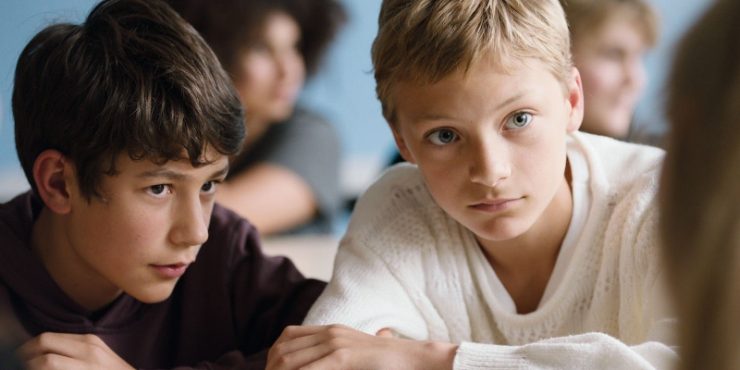Over time, the Belgian film industry has developed a well-earned reputation for grim slice-of-life dramas that examine the granular aspects of domestic ennui. Writer-director Lukas Dhont is a follower in that tradition, though his two films have more of a flair for the melodramatic than, say, the Dardenne Brothers, who are often cited as the forefathers of this particular style of immediate naturalism. Dhont’s latest film, Close, won the Grand Prix at this year’s Cannes Film Festival (getting awards from Cannes is another thing he can share with the Dardennes), and it focuses on a friendship between two young boys. Like his debut, Girl, Dhont’s film is about young queer people trying to navigate existing in a hostile world, a world that can only befall tragedy on those it doesn’t accept.
Leo (Eden Dambrine) and Remí (Gustav de Waele) are the best of friends, spending every waking moment with one another and often sleeping over each other’s house. Leo’s family runs a farm that often requires assistance from he and his older brother, while Remí’s mother (an excellent Émelie Dequenne) is a maternity nurse. Neither Leo or Remí’s parents take particular notice of their sons’ devoted intimacy. Acceptance comes easy in both families, which only adds to the blissful nature of the fun the boys have with one another. But upon arriving in school, mean-spirited classmates make comments about their relationship, with girls making giggling comments and boys spouting outright homophobia for laughs. This leaves Leo unmoored, and almost without realizing it, he finds himself pulling away from his best friend.
It’s difficult to talk about the plot of Close without giving away carefully guarded details, which I won’t reveal but will still leave a general **SPOILER ALERT** warning for those who want to view as cold as possible. A third of the way into the movie Close‘s plot shifts so fully into tragedy in a way that is possibly easy to predict but still feels like a diabolical trick that Dhont pulls on the audience. The moment, agonizing in its slow reveal, completely changes the trajectory of where you think the film may go, and undoes all of the warmth from the film’s opening scenes, replacing it with unfettered pain. There is something very dramatically compelling about Leo’s measured resistance to his own feelings and behavior, but Close decides that that is not where the film’s interests lie, choosing instead to tell a weepy story of calamity and despair.
Perhaps my own allergy to Belgian realist drama was perked up here. It’s hard to argue against Dhont’s superlative direction of his actors and the tenderness with which those actors play the roles. Dambrine and de Waele as the two boys are heartbreaking in their roles, and if you listen closely, you’ll likely notice a lot of your fellow audience members choking sobs and wiping away tears. This did not have that effect on me. The attempts at day-in-the-life verisimilitude feels forced, the drama heightened by blatant script contrivances. This is a world filled with tragedy, especially toward queer youth, but Dhont equates the senselessness of said tragedy with romantic poeticism in a way that seemed in poor taste. Close wallows in the misery of the very people it means to represent humanely, and while his skills behind the camera are obvious, his judgment as a storyteller still feels spotty.
Directed by Lukas Dhont










